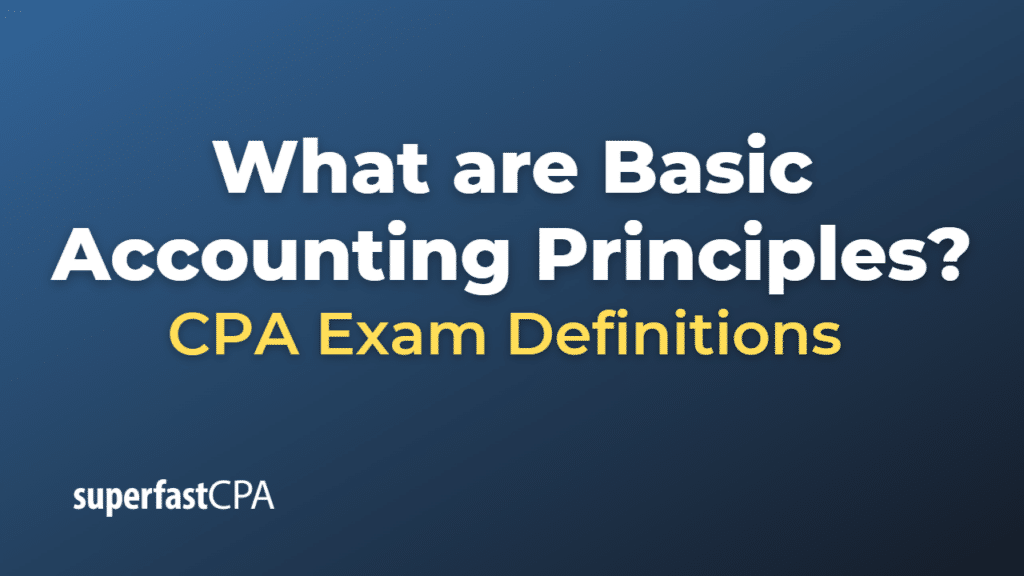Basic Accounting Principles
Basic accounting principles are the fundamental guidelines and concepts that govern the practice of accounting. These principles ensure consistency, reliability, and comparability of financial information across different businesses and time periods. Some of the most important basic accounting principles include:
- Accrual basis accounting: This principle states that financial transactions should be recorded when they are incurred, rather than when cash is exchanged. This approach provides a more accurate picture of a company’s financial position and performance.
- Economic entity assumption: This principle assumes that a business is a separate economic entity from its owners or shareholders. This means that the financial activities of the business should be recorded and reported separately from the personal financial activities of its owners.
- Monetary unit assumption: This principle states that financial transactions and events should be measured and reported in a common currency. This allows for a consistent and comparable presentation of financial information.
- Time period assumption: This principle assumes that a business’s financial activities can be divided into distinct time periods, such as months, quarters, or years. This allows for the periodic reporting of financial information, which is essential for decision-making and performance evaluation.
- Cost principle: According to this principle, assets should be recorded at their historical cost, which is the amount paid to acquire the asset. This principle emphasizes objectivity and verifiability in accounting.
- Revenue recognition principle: This principle states that revenue should be recognized when it is earned and realized or realizable, regardless of when cash is received. This ensures that financial statements reflect the company’s financial performance accurately.
- Matching principle: This principle requires that expenses be matched with the revenues they help generate in the same accounting period. This principle ensures that financial statements provide an accurate picture of a company’s profitability.
- Full disclosure principle: This principle states that businesses should disclose all relevant information about their financial position and performance in their financial statements. This ensures that financial information is transparent and useful to users.
- Materiality: According to this principle, financial information is considered material if its omission or misstatement could influence the decisions of users. Materiality helps accountants determine which information should be included in financial statements and allows for some flexibility in applying accounting principles.
- Conservatism: This principle states that when faced with uncertainty, accountants should choose the method or estimate that is least likely to overstate assets or income or understate liabilities or expenses. This principle ensures that financial statements do not present an overly optimistic view of a company’s financial position or performance.
Understanding and applying these basic accounting principles is crucial for preparing accurate and reliable financial statements, which are essential for decision-making by business owners, investors, creditors, and other stakeholders.
Example of Basic Accounting Principles
Let’s consider a fictional example of a small business called “Lily’s Flower Shop” to illustrate how basic accounting principles are applied in real-world situations.
- Accrual basis accounting: Lily’s Flower Shop provides flower arrangements for a wedding and sends the invoice to the client. The client will pay in 30 days. Lily records the revenue as earned at the time of delivery, not when the cash is received.
- Economic entity assumption: Lily, the owner of the flower shop, purchases a delivery van for the business. She records the cost of the van as an asset in the flower shop’s financial records, not in her personal financial records.
- Monetary unit assumption: Lily’s Flower Shop operates in the United States and records all its financial transactions in US dollars, ensuring a consistent and comparable presentation of financial information.
- Time period assumption: Lily’s Flower Shop prepares financial statements on a monthly basis, allowing Lily to track the business’s financial performance and make informed decisions.
- Cost principle: Lily’s Flower Shop purchases a new cash register for $1,500. The cash register is recorded in the financial records at its historical cost of $1,500, not its current market value.
- Revenue recognition principle: Lily’s Flower Shop sells a bouquet of flowers to a customer for $100. The revenue is recognized when the bouquet is handed to the customer, even if the payment is received at a later date.
- Matching principle: Lily’s Flower Shop incurs expenses for flowers, labor, and utilities to create the bouquet. These expenses are recorded in the same accounting period as the revenue generated from selling the bouquet, ensuring an accurate representation of the shop’s profitability.
- Full disclosure principle: Lily’s Flower Shop includes detailed notes in its financial statements to disclose information about its accounting policies, long-term debt, and other relevant financial data.
- Materiality: Lily’s Flower Shop accidentally underestimates the cost of flowers for a bouquet by $2. Since the error is unlikely to impact the decisions of financial statement users, it is considered immaterial and not corrected in the financial statements.
- Conservatism: When estimating the value of its inventory, Lily’s Flower Shop opts for a conservative estimate that does not overstate the value of the inventory or understate the cost of goods sold.
By applying these basic accounting principles, Lily’s Flower Shop can maintain accurate and reliable financial records, providing essential information for decision-making and performance evaluation.













